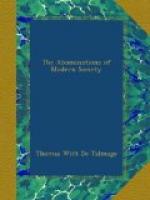What could be more innocent than a birthday festival? All the kings from the time of Pharaoh had celebrated such days; and why not Herod? It was right that the palace should be lighted, and that the cymbals should clap, and that the royal guests should go to a banquet; but, before the rioting and wassail that closed the scene of that day, every pure nature revolts.
Behold the work, the influence, and the end of an infamous dancer!
I am, by natural temperament and religious theory, utterly opposed to the position of those who are horrified at every demonstration of mirth and playfulness in social life, and who seem to think that everything, decent and immortal, depends upon the style in which people carry their feet. On the other hand, I can see nothing but ruin, moral and physical, in the dissipations of the ball-room, which have despoiled thousands of young men and women of all that gives dignity to character, or usefulness to life.
Dancing has been styled “the graceful movement of the body adjusted by art, to the measures or tune of instruments, or of the voice.” All nations have danced. The ancients thought that Pollux and Castor at first taught the practice to the Lacedaemonians; but, whatever be its origin, all climes have adopted it.
In other days there were festal dances, and funeral dances, and military dances, and “mediatorial” dances, and bacchanalian dances. Queens and lords have swayed to and fro in their gardens; and the rough men of the backwoods in this way have roused up the echo of the forest. There seems to be something in lively and coherent sounds to evoke the movement of hand and foot, whether cultured or uncultured. Men passing the street unconsciously keep step to the music of the band; and Christians in church unconsciously find themselves keeping time with their feet, while their soul is uplifted by some great harmony. Not only is this true in cultured life, but the red men of Oregon have their scalp dances, and green-corn dances, and war dances. It is, therefore, no abstract question that you ask me—Is it right to dance?
The ancient fathers, aroused by the indecent dances of those days, gave emphatic evidence against any participation in the dance. St. Chrysostom says:—“The feet were not given for dancing, but to walk modestly; not to leap impudently like camels.”
One of the dogmas of the ancient church reads: “A dance is the devil’s possession; and he that entereth into a dance, entereth into his possession. The devil is the gate to the middle and to the end of the dance. As many passes as a man makes in dancing, so many passes doth he make to hell.” Elsewhere, these old dogmas declare—“The woman that singeth in the dance is the princess of the devil; and those that answer are his clerks; and the beholders are his friends, and the music are his bellows, and the fiddlers are the ministers of the devil; for, as when hogs are strayed, if the hogs’-herd call one, all assemble together, so the devil calleth one woman to sing in the dance, or to play on some instrument, and presently all the dancers gather together.”




